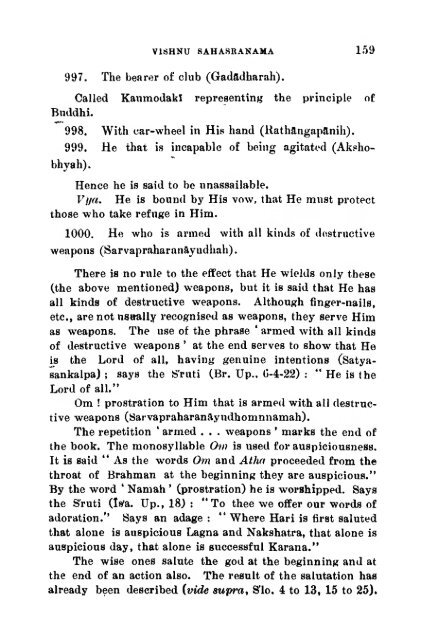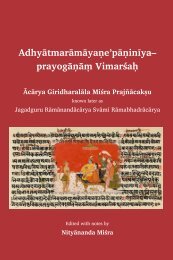Vishnu.Sahasranama.with.the.Bhasya.of.Sankaracharya_text
Vishnu.Sahasranama.with.the.Bhasya.of.Sankaracharya_text
Vishnu.Sahasranama.with.the.Bhasya.of.Sankaracharya_text
You also want an ePaper? Increase the reach of your titles
YUMPU automatically turns print PDFs into web optimized ePapers that Google loves.
VISHNU SAHA8RANAMA 159<br />
997. The bearer <strong>of</strong> club (Gadadharah).<br />
Called KaumodakI representing <strong>the</strong> principle <strong>of</strong><br />
Buddhi.<br />
998. With ear-wheel in His hand (Hathangapanih).<br />
999. He that is incapable <strong>of</strong> being agitated (Ak?ho-<br />
bhyah).<br />
Hence he is said to be unassailable.<br />
Vya. He is bound by His vow, that He must protect<br />
those who take refuge in Him.<br />
1000. He who is armed <strong>with</strong> all kinds o£ destructive<br />
weapons (Sarvapraharanayudhah)<br />
There is no rule to <strong>the</strong> effect that He wields only <strong>the</strong>se<br />
(<strong>the</strong> above mentioned) weapons, but it is said that He has<br />
all kinds <strong>of</strong> destructive weapons. Although finger-nails,<br />
etc., are not usually recognised as weapons, <strong>the</strong>y serve Him<br />
as weapons. The use <strong>of</strong> <strong>the</strong> phrase ' armed <strong>with</strong> all kinds<br />
<strong>of</strong> destructive weapons ' at <strong>the</strong> end serves to show that He<br />
is <strong>the</strong> Lord <strong>of</strong> all, having genuine intentions (Satya-<br />
sankalpa) ; says <strong>the</strong> S'ruti (Br. Up., 0-4-22) : " He is <strong>the</strong><br />
Lord <strong>of</strong> all."<br />
Om ! prostration to Him that is armed <strong>with</strong> all destructive<br />
weapons (Sarvapraharanayudhomnnamah).<br />
The repetition ' armed . . . weapons ' marks <strong>the</strong> end <strong>of</strong><br />
<strong>the</strong> book. The monosyllable Om is used for auspiciousness.<br />
It is said " As <strong>the</strong> words Om and Atlut proceeded from <strong>the</strong><br />
throat <strong>of</strong> Brahman at <strong>the</strong> beginning <strong>the</strong>y are auspicious."<br />
By <strong>the</strong> word ' Namah ' (prostration) he is worshipped. Says<br />
<strong>the</strong> S'ruti (Is'a. Up., 18) : "To <strong>the</strong>e we <strong>of</strong>fer our words <strong>of</strong><br />
adoration.'' Says an adage : " Where Hari is first saluted<br />
that alone is auspicious Lagna and Nakshatra, that alone is<br />
auspicious day, that alone is successful Karana."<br />
The wise ones salute <strong>the</strong> god at <strong>the</strong> beginning and at<br />
<strong>the</strong> end <strong>of</strong> an action also. The result <strong>of</strong> <strong>the</strong> salutation has<br />
already been described (vide supra, Slo. 4 to 13, 15 to 25).<br />
.



